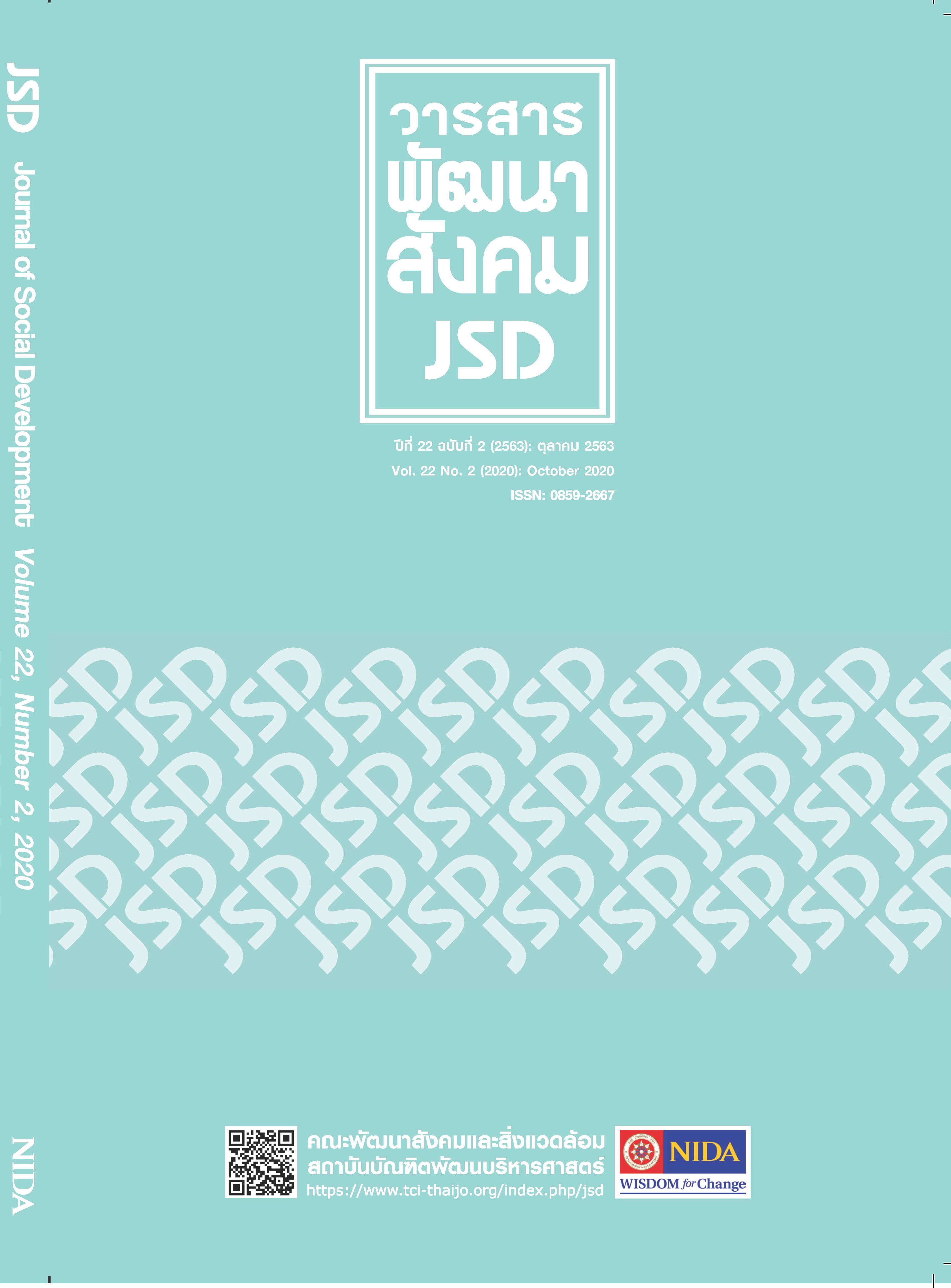Potentiality Development of Tourism Social Enterprises in Thailand
Main Article Content
Abstract
Article Details
References
Alter, K. (2007). Social Enterprise Typology. Virtue Ventures LLC. Retrieved September 16, 2016 from http://www.virtueventures.com/setypology.pdf
Ankinun, P. (2011). Social Entrepreneurship: An Integrated Framework for Earned Income Opportunities Adoption by Nonprofit Organizations in Thailand. Doctoral dissertation, The National Institute of Development Administration.
Choibamroong, T. (2009). On Roles of The Local Administrations of Thailand in Developing Tourism under The Economic Sufficiency Theory [In Thai]. Bangkok: King Prajadhipok’s Institute.
Department of Tourism. (2007). CBT Tourism Network Handbook [In Thai]. Bangkok: Author.
Elkington, J. (1997). Cannibals with Forks: The Triple Bottom Line of 21st Century Business. Oxford: Capstone Publishing.
Humphrey, A.S. (2005). SWOT Analysis for Management Consulting. SRI International Alumni Association Newsletter. (2005, December): 7-8.
Kosol, O. & Suttawet, C. (2013). Sustainable Tourism Management for Supporting ASEAN Economics Community [In Thai]. Journal of Politics and Governance. 4, 220-232.
Lepoutre, J., Justo, R., Terjesen, S. & Bosma, N. S. (2013). Designing a global standardized methodology for measuring social entrepreneurship activity: The global entrepreneurship monitor social entrepreneurship study. Small Business Economics. 40(3), 693-714.
Local Economy and Pracharath Working Group. (2017). Pracharath Rak Samakkee Handbook [In Thai]. Bangkok: Office of Local Economy and Pracharath.
Mali, K. (2014). Social Enterprise in Thailand [In Thai]. Journal of Economics and Management Strategy. 1, 104-112.
Nittayakasetwat, E. (2011). The Development of Social Enterprises in Thailand and Other Countries: Case Studies and Best Practice Applications [In Thai]. The NIDA Business Journal. 8, 1-32.
Office of the National Economic & Social Development Board. (2017). The Twelfth National Economic and Social Development Plan (2017-2021) [In Thai]. Bangkok: NESBD.
Responsible Ecological Social Tours Project. (1997). CBT Handbook [In Thai]. Bangkok: Author.
Robinson, J. A., Mair, J. & Hockerts K. (Ed). (2009). International Perspective on Social Entrepreneurship. London: Palgrave Macmillan.
Sansanividhayakul, I. (2013). The Analysis of Social Enterprise Policy by Using Policy Network Approach [In Thai]. Modern Management Journal. 11, 39-57.
Secretariat of the House of Representatives. (2015). National Reform Council Special Reform Agenda 1: Social Enterprise [In Thai]. Bangkok: Author.
Siripattarasopon, S. (2015). A Conceptual Study of Social Enterprise Development in Thailand. [In Thai]. Journal of the Association of Researchers. 20, 30-46.
Sitikarn, B. & Jaima, S. (2010). Development of Local Authority's Roles in Facilitation Logistics of Community-based Tourism Destinations in Upper Northern Region Thailand [In Thai]. Bangkok: National Research Council of Thailand.
Thai Social Enterprise Office. (2010). Social Enterprise Master Plan 2010-2014 [In Thai]. Bangkok: TSEO.
Thai Social Enterprise Office. (2016). SE 100 [In Thai]. Bangkok: TSEO.
The Government Public Relations Department. (2016). Pracharath Rak Samakkhi [In Thai]. The Government Newsletter. 2, 6-7.
The Ministry of Tourism & Sports Thailand. (2012). The National Tourism Development Plan (2012 - 2016) [In Thai]. Bangkok: Office of Permanent Secretary Ministry of Tourism and Sports.
The Ministry of Tourism & Sports Thailand. (2017). The Second National Tourism Development Plan (2017 - 2021) [In Thai]. Bangkok: Office of Permanent Secretary Ministry of Tourism and Sports.
Thiemboonkit, S. (2013). An Exploratory Study of the Development Social Entrepreneurship: Key Concepts, Characteristics, Roles and Success Factors of Social Enterprise in Thailand. Doctoral dissertation, The National Institute of Development Administration.
Trivedi, C. (2013). Social Entrepreneurship: Ecological Consciousness and Collective Processes. Doctoral dissertation, University of California, Irvine.
United Nation Environment Programme & World Tourism Organization. (2005). Making Tourism More Sustainable - A Guide for Policy Makers. Paris: Author.
Von De Weppen, J. & Cochrane, J. (2012). Social Enterprise in Tourism: An Exploratory Study of Operational Models and Success Factors. Journal of Sustainable Tourism. 20, 497-511.
World Tourism Organization. (2005). Understanding Tourism: Basic Glossary. Retrieved from http://cf.cdn.unwto.org/sites/all/files/docpdf/glossaryenrev.pdf
Yunus, M. (2007). Creating a World without Poverty: Social Business and the Future of Capitalism. New York: Public Affairs.


